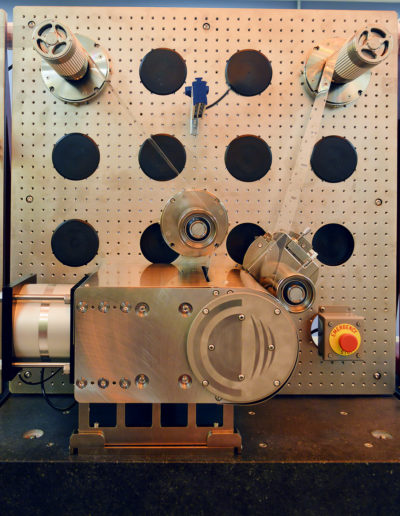
Thermal Emboss
Thermal NIL is embossing into a thermoplastic material or thermoplastic coating. In this case the web material is typically heated up to 20-40 degrees above its Tg or glass transition temperature while a very large load, up to 5000 pounds, is applied to a pinch roller to flow the substrate into the features of relieved embossing roller. Then the material is cooled below the glass transition temperature by about 20 degrees and the material is stripped from the thermal embossing roller revealing the replicated surface.
Product Description and Features
Up to nine circumferential thermal zones on the embossing roller may be individually set and controlled. The master is an electroformed nickel sleeve provided by Carpe Diem which may be patterned or on which patterned shims maybe affixed. Especially good materials for embossing are Polycarbonate and Topas® Cyclic Olefin Copolymer.
All of the process parameters are set conveniently from Carpe Diem’s Human Machine Interface (HMI). They are reached by touching the graphic icon of the process on the visual machine. A pop-up menu provides the available parameters to be set or calibrated.
- Qualified with food and pharmaceutical grade plastics
- High speed, dependent on power in, out
- No adhesion issues as with UV Polymers
- Thermal shrinkage must be compensated
Thermal Emboss Specifications
| Imprint Force | Up to 25kN |
| Max Heating Temperature | Up to 200 °C |
| Max Heating Power | 3600W |
| Min Cooling Temperature | 40°C |
| Min Cooling Power | 3600W(assumes process cooling water available) |
| Structure Size | From <10 nm to millimeters |
| Optional sensor for splice detection | Optional Camera |
| Rotary Encoder | million count per revolution |
| Speed | 4 in/min up to 800in/min (100mm/min up to 20000mm/min) |
| Web Width | 6 in to 12 in (150mm to 300m) |
| Web Thickness | 10μm up to 250μm |
| External Roll Diameter | maximum 3in @ 6in web width |
| Web Tensile Stress Materials | Typical 0.5-5lbs nominal tension |
| Materials | PC,PMMA,PET,PS |

